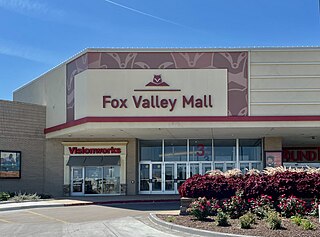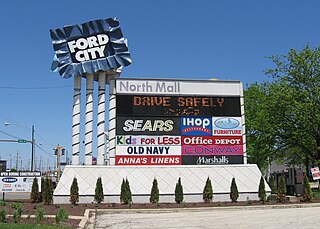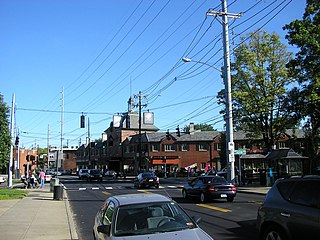Shopper's World is an open-air shopping center in Framingham, Massachusetts. The original facility is of historical significance as one of the first suburban shopping malls in the United States upon opening in 1951; it was demolished and replaced by the current open-air facility in 1994. The retail park, with the adjacent Natick Mall in Natick, are major components of the Golden Triangle shopping district in the center of MetroWest, situated between Route 9 and Route 30.

ear X-tacy was a Louisville, Kentucky "alternative record store," owned and operated by John Timmons. The store announced its closing on October 31, 2011, after 26 years in business.
Highlands–Douglass is a neighborhood five miles (8 km) southeast of downtown Louisville, Kentucky, United States. The neighborhood is bound by Bardstown Road, Speed Avenue, Taylorsville Road, and Cherokee Park. It is considered a part of a larger area of Louisville called The Highlands. It is often simply called Douglass.

Fox Valley Mall, formerly Westfield Fox Valley, is a shopping mall in Aurora, Illinois. The mall's anchor stores are JCPenney and Macy's. Some larger non anchor stores include H&M and Forever 21. A Round One Entertainment is located in the former Sears wing. The Westfield Group acquired the shopping center in early 2002, and renamed it "Westfield Shoppingtown Fox Valley", dropping the "Shoppingtown" name in June 2005. Westfield Group sold 80% interest in mall as of December 2015.

Since it earliest days, the economy of Louisville, Kentucky, has been underpinned by the shipping and cargo industries. Today, Louisville, Kentucky is home to dozens of companies and organizations across several industrial classifications.

Oxmoor Center is a Louisville, Kentucky shopping mall located at 7900 Shelbyville Road in eastern Louisville.

Ford City Mall is a shopping mall located on the Southwest Side of Chicago in the West Lawn neighborhood at 76th Street and Cicero Avenue. Opened in 1965, Ford City is the largest shopping mall in Chicago outside of downtown. Anchored by JCPenney, the mall contains more than 135 stores and restaurants including Applebee’s, Bath & Body Works, The Children’s Place, Foot Locker, Zales Jewelers, Marshalls, Old Navy, Victoria’s Secret/PINK, and Ross Dress for Less. There are several out parcels including a 14-theater AMC Theatres. Ford City Mall is managed by Mid-America Asset Managements.
The New Sudbury Centre is a shopping mall located in Greater Sudbury, Ontario, Canada. It has 110 stores and 562,619 square feet (52,269.0 m2) of retail space.
Bashford Manor Mall, named for the surrounding neighborhood of Bashford Manor, was a 560,000-square-foot (52,000 m2) enclosed mall in Louisville, Kentucky which opened in 1973 and once had about 85 stores, including Ayr-Way, Bacon's, and Ben Snyder's.

River Roads Mall, also known as River Roads Shopping Center, was an enclosed shopping mall located in the city of Jennings, a suburb of St. Louis, Missouri, United States. Opened in 1962 as one of the nation's first shopping malls, it featured J. C. Penney, F. W. Woolworth Company, Kroger, and Stix, Baer & Fuller as its anchor stores. The mall was expanded in 1972 with a new location of J. C. Penney, but began losing major stores in the early 1980s. J. C. Penney closed in 1983, but was soon reopened as an outlet store, while Stix, Baer & Fuller was sold to Dillard's in 1984 and closed only two years later. Tenancy continued to decline throughout the 1990s, culminating in the closure of the J. C. Penney outlet and mall proper in 1995, although the abandoned structure was not demolished until 2006.

The Schuster Building is a mixed-use structure at the intersection of Bardstown Road and Eastern Parkway in the Highlands area of Louisville, Kentucky. Added to the National Register of Historic Places in 1980 as a "significant example" of Colonial Revival architecture as applied to commercial buildings, the Schuster building is one of Louisville's most prominent examples of that style.

Ashley Landing is a shopping mall in Charleston, South Carolina, United States. It was the first indoor shopping mall in the West Ashley area of Charleston when the complex was fully completed in 1972. The center, located at 1401 Sam Rittenberg Boulevard at the fork of Old Towne Road was developed by Gate City Realty Company of Fort Lauderdale, Florida. Ground was broken for the complex in 1962 with Ashley Plaza opening on April 16, 1964. At its opening the shopping center consisted of J.M. Fields Department Stores joined to a Pantry Pride supermarket, built at a cost of $1.75 million and owned by Sumar Corporation of South Carolina. The locally owned Condon's Department Store, constructed adjacent to Pantry Pride as a freestanding building, became the third tenant when it opened in 1970. The center, originally known as "Ashley Plaza" was noted for its large red and white neon pylon "Ashley Plaza" sign in the center of the parking lot that remained until 1989 when it was destroyed by Hurricane Hugo.

North Hill Centre is a shopping mall in Calgary, Alberta, Canada. It opened in 1958, and was Calgary's first shopping mall. The original anchor tenant was Simpsons-Sears, but it closed on January 8, 2018.
Maryvale Mall, originally known as Maryvale Shopping City, was a shopping mall in the Maryvale area of Phoenix, Arizona that, for a time, was the biggest shopping mall between Dallas, Texas and the West Coast.

The parkway system of Louisville, Kentucky, also known as the Olmsted Park System, was designed by the firm of preeminent 19th century landscape architect Frederick Law Olmsted. The 26-mile (42 km) system was built from the early 1890s through the 1930s, and initially owned by a state-level parks commission, which passed control to the city of Louisville in 1942.

Washington Square Mall is a shopping mall located in Evansville, Indiana, United States. It opened October 31, 1963 and was the first enclosed shopping center in Indiana. Developed by Erie Investments, the mall was originally anchored by Sears and an A & P supermarket. Louisville-based Stewart Dry Goods was added, as a second anchor department store, in 1969. This store -as well as the entire chain- was merged with Indianapolis' L. S. Ayres chain in 1980.
Highlands Mall is a former shopping mall in Harrison Township, Pennsylvania that operates today as an open-air shopping center. It opened in 1977 and closed in 2006, reopening after its redevelopment in 2008.
The Louisville Zombie Attack started on August 29, 2005, as a flash mob, is a public event in Louisville, Kentucky held annually in August. Before 2016, it had been held on August 29 at 8:29 p.m., but the 2016 event was moved to August 27 at the same time and rebranded as the "Louisville Zombie Walk". This resulted in a lawsuit between two of the event's co-founders, John King and Lyndi Curtis, which resulted in Curtis abandoning all rights to the event. The Louisville Zombie Walk's co-organizer, Jason Bessemann, was not named in the suit and went on to promote the 2017 Louisville Zombie Walk as a separate event three days before the original. Several thousand participants dressed and made up as zombies gather in the Highlands area and march down Bardstown Road to the end point of the walk. An after party is typically thrown by all the bars included in the nightlife throughout the street after the walk. Some of the bars included are: Nowhere Bar, Highlands Taproom, Big Bar, Baxter's, and many others in the local area. Throughout the years, the walk grew by thousands as word of mouth caught on. The last few years, the walk has generated over 10,000 walkers, with 30,000 in 2013 and 32,000 in 2014. Over 40,000 walkers were anticipated for the 2015 event. It began as a birthday party for three friends, but has turned into a real event recognized by local businesses. The event typically costs around $10,000 to function, but the event is kept free to the public due to donations.
















